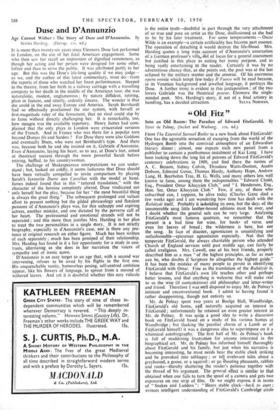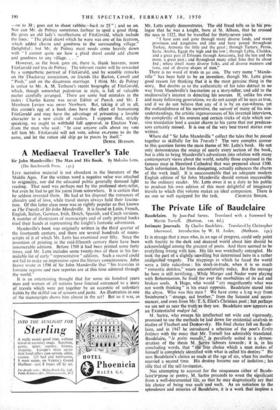it Old Fitz "
FROM The Essential Samuel Butler to a new book about FitzGerald! One has the agreeable sensation of escaping from the world of the Hydrogen Bomb into the convivial atmosphere of an Edwardian literary dinner ; almost, one expects each new parcel from a publisher to contain a posthumous instalment of Kai Lung. I have been looking down the long list of patrons of Edward FitzGerald's centenary celebrations in 1909, and find there the names of A. C. Benson, Sidney Colvin, Theodore Watts-Dunton, Austin Dobson, Edmund Gosse, Thomas Hardy, Anthony Hope, Andrew Lang, H. Beerbohm Tree, H. G. Wells, and many others less well known to fame, among them the indispensables " Edward Clodd, Esq., President Omar Khayyam Club," and " J. Henderson, Esq., Hon. Sec. Omar Khayyam Club." Few, if any, of those who subscribed can, I suppose, be alive today (Charles Ganz died a few weeks ago) and I am wondering how time has dealt with the Rubcilycit itself. Probably it is.holding its own, but the days of the innumerable snug little leather-bound editions must be over, and I doubt whether the general sale can be very large. Analysing FitzGerald's most famous quatrain, we remember that the present is a bad time for wine, for books of verse, and even for loaves of bread ; the wilderness is here, but not the song. In face of disaster, agnosticism is unsatisfying and unfashionable—epicurean agnosticism especially. Not that the temperate FitzGerald, the always charitable person who attended Church of England services until past middle age, can fairly be called irreligious. Mrs. Cowell, one pf his best friends, properly described him as a man " of the highest principles, as far as man can be, who doubts if Scripture be altogether the highest guide." It has been the mistake of many people to persist in identifying FitzGerald with Omar. Fine as the translation of the Rubaiycit is, I believe that FitzGerald's own life teaches other and perhaps better lessons, and that anything is welcome that will make real to us the wise (if cantankerous) old philosopher and letter-writer and friend. Therefore I was well disposed to enjoy Mr. de Polnay's intimate and unconventional book. I admit to having found it rather disappointing, though not entirely so.
Mr. de Polnay spent two years at Boulge Hall, Woodbridge, FitzGerald's old home, kid naturally acquired an interest in FitzGerald unfortunately he retained an even greater interest in Mr. de Polnay. It was quitg a good idea to write a discursive book on FitzGerald based on a study of his various homes at Woodbridge ; but (lacking "the 'peculiar charm of a Lamb or of FitiGerald himself) it was a dangerous idea to superimpose on it a whimsical autobiography. The first half of Mr. de Polnay's book is full of maddening frustration for anyone interested in the biographical art. Mr. de Polnay has informed himself thoroughly about FitzGerald and his family, but just when his narrative is becoming interesting, he must needs hear the stable clock striking and be provoked into soliloquy ; or tell irrelevant tales about a greyhound, a goose, or a squirrel • or go Mooting pheasants, rabbits and rooks—thereby shattering the reader's patience together with the thread of his argument. The general effect is similar to that obtained when one fails to turn the spool of a camera and gets two exposures on one strip of film. Or we might express it in terms of " Snakes and Ladders ": " Hears stable clock—back to start ; evinces intelligent understanding of FitzGerald's Cambridge circle —on to 38 ; goes out to shoot rabbits-:–back to 25 " ; and so on. Nor can Mr. de Polnay sometimes forbear to spoil a good thing. He gives an old lady's recollections of FitzGerald, which include the lines: " The plaid shawl which he wore was one of his features, which added charm and goodness to the surrounding village." Delightful ; but Mr. de Polnay must needs come heavily down with " I cannot quite see how a plaid shawl could add charm and goodness to any village. . . ."
However, as the book goes on, there is, thank heavens, more FitzGerald and less de Polnay. The tolerant reader will be rewarded by a sympathetic portrait of FitzGerald, and by sensible remarks on the Thackeray association, on friends like Barton, Cowell and " Posh," and on the disastrous marriage. I think Mr. de Polnay is unfair to. Mr. A. M. Terhune's recent biography of FitzGerald, which, though somewhat pedestrian in style, is full of valuable matter carefully arranged. There are some bad mistakes in the index : Charles Keene was never Editor of Punch, and Mr. J. Mewburn Levien was never Newburn. But, taking it all in all, this curate's egg of a book does have the effect of humanising FitzGerald and may have the advantage of piesenting a lovable character to a new circle of readers. I suppose that, strictly speaking, we ought to withhold full approval, in Election Year, ,from the man who said: "In case anyone calls about my vote tell him Mr. FitzGerald will not vote, advise everyone to do the same, and let the rotten old ship go to pieces by itself."
DEREK HUDSON.



































 Previous page
Previous page